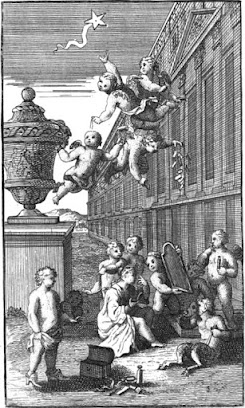Hello Friends,
This blog is my response to the task assigned to us by our teacher VaidehiMa'am. So read and enjoy.
The Rape of the Lock is a mock-heroic narrative poem written by Alexander Pope. One of the most commonly cited examples of high burlesque, it was first published anonymously in Lintot's Miscellaneous Poems and Translations (May 1712) in two cantos (334 lines); a revised edition "Written by Mr. Pope" followed in March 1714 as a five-canto version (794 lines) accompanied by six engravings. Pope boasted that this sold more than three thousand copies in its first four days.[2] The final form of the poem appeared in 1717 with the addition of Clarissa's speech on good humour. The poem was much translated and contributed to the growing popularity of mock-heroic in Europe.
While Belinda is still asleep, her guardian Sylph Ariel forewarns her that "some dread event impends". Belinda then awakes and gets ready for the day with the help of her maid, Betty. The Sylphs, though unseen, also contribute: "These set the head, and those divide the hair, some fold the sleeve, whilst others plait the gown" (146–147). Here Pope also describes Belinda's two locks of hair "which graceful hung behind". The Baron, one of Belinda's suitors, greatly admires these locks and conspires to steal one. Building an altar, he places on it "all the trophies of his former loves" (line 40), sets them on fire and fervently prays "soon to obtain, and long possess" (line 44) the lock.
Ariel, disturbed by the impending event although not knowing what it will be, summons many sylphs to her and instructs them to guard Belinda from anything that may befall her, whether she "forget her prayers, or miss a masquerade, Or lost her heart, or necklace, at a ball" (line 108–109). So protected, Belinda arrives at Hampton Court and is invited to play a game of ombre.
The conspiring Baron acquires a pair of scissors and tries to snip off one of her locks, but he is prevented by the watchful Sylphs. This happens three times, but in the end the Baron succeeds (also cutting a Sylph in two although Pope reassures us, parodying a passage in Paradise Lost, that "airy substance soon unites again" [line 152]). When Belinda discovers her lock is gone, she falls into a tantrum, while the Baron celebrates his victory.
A gnome named Umbriel now journeys to the Cave of Spleen and from the Queen receives a bag of "sighs, sobs, and passions, and the war of tongues" (canto 4 line 84) and a vial filled "with fainting fears, soft sorrows, melting griefs, and flowing tears" (line 85–86) and brings them to Belinda. Finding her dejected in the arms of the woman Thalestris, Umbriel pours the contents over them both.
Many people, moved by Belinda's grief, demand the lock back, but the Baron is unrepentant and refuses. Clarissa admonishes them to keep their good humour, but they will not listen and instead a battle ensues with glares, songs and wits as weapons. Belinda fights with the Baron and throws snuff up his nose to subdue him. When she demands that he restore the lock, however, it is nowhere to be found. It has been made a constellation and is destined to outlast the contestants.
Belinda sails down the Thames to Hampton Court attended by sylphs; a copperplate engraving by Anna Maria Werner (1744)
☆ Gender Roles
In The Rape of the Lock, Pope constantly manipulates traditional gender roles to satiric effect. He portrays Belinda, the poem’s protagonist, alternately as an epic hero preparing for battle (I.139-44), a cunning military general reviewing his troops (III.45-6), and a Moor bellowing in rage (V.105-6). The poem thus describes Belinda in specifically male terms: heroism, battle, anger. Other women in the poem similarly demonstrate masculine characteristics. Thalestris displays her prowess on the battlefield while Clarissa provides a weapon to the otherwise impotent Baron. By contrast, the men act with feminine delicacy, fainting during the battle. Pope figures the Baron in mostly feminine terms. He is a fop, willing to prostrate himself before the altar of Love, and he cannot act on his desire without the explicit assistance of a woman. When Belinda conquers him in battle, she stands above him in a position of dominance. Even the poem’s more mechanical elements partake in this reversal of gender roles. The mythological sprites literally switch genders after they die, transforming from human women to male spirits. All this gender manipulation calls attention to the perverse behaviors of this fictional society. The poem certainly alludes to the expected behavior of each gender role: women should act with modesty while men should embody heroic and chivalric ideals. However, these characters flout the rules of traditional society.
☆ Female Sexuality
Pope frequently focuses on female sexuality and the place of women in society throughout the corpus of his poetry, and it was a popular topic in the early eighteenth century (just think of Jonathan Swift’s misogynistic poems). The Rape of the Lock does not, however, feature a Swiftian tirade concerning the evils of women. It instead makes a considered exploration of society’s expectations for women. The rules of eighteenth-century society dictate that a woman attract a suitable husband while preserving her chastity and virtuous reputation. Pope renders this double-standard dramatically in his depiction of Belinda’s hair, which attracts male admirers, and its petticoat counterpart, which acts as a barrier to protect her virginity. Of course, a woman who compromised her virtue—either by deed or reputation—usually lost her place in respectable society. Pope examines the loss of reputation in the poem’s sexual allegory, i.e., the “rape” of the lock. By figuring the severing of Belinda’ hair as a sexual violation, Pope delves into implications of sexual transgression. After the Baron steals her curl, Belinda exiles herself from the party, retiring to a bedchamber to mourn her loss. Pope thus dramatizes the retreat from society that a sexually-compromised woman would eventually experience. Though Belinda is ultimately celebrated, not ostracized, by her community, her narrative provides Pope with the opportunity to explore society’s views on female sexuality.
☆ References
1. "The Rape of the Lock." - Wikipedia, Wikimedia Foundation, Inc, 16 Jan. 2021, en.m.wikipedia.org/wiki/The_Rape_of_the_Lock. Accessed 25 Jan. 2021.




